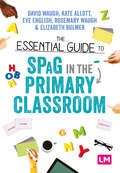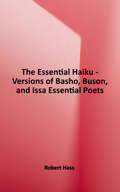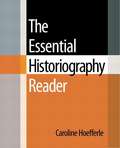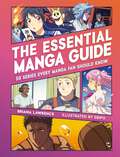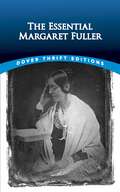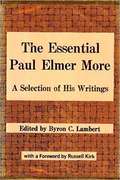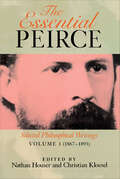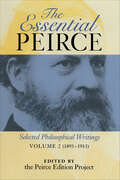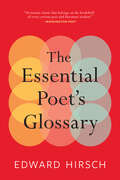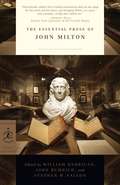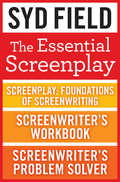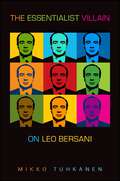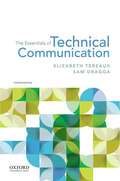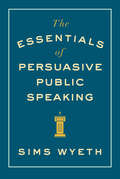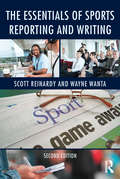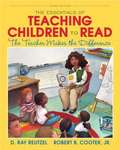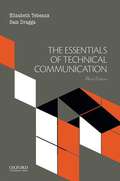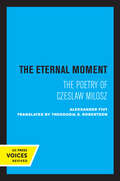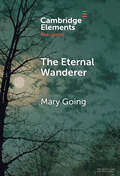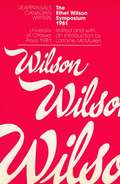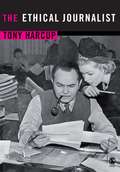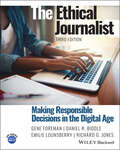- Table View
- List View
The Essential Guide to SPaG in the Primary Classroom (Ready to Teach)
by David Waugh Rosemary Waugh Kate Allott Eve English Elizabeth BulmerDo you know your ′determiners′ from your ′prepositions′? Are you struggling with word classes, phrases and clauses? This book is here to help by: Telling you what you need to know to teach all areas of primary grammar Explaining what′s good to know to support more able children Outlining what good teaching of each part of grammar looks like in the classroom Suggesting classroom activities for all areas of the SPaG curriculum Also included is a section on the new SPaG test.
The Essential Guide to SPaG in the Primary Classroom (Ready to Teach)
by David Waugh Rosemary Waugh Kate Allott Eve English Elizabeth BulmerDo you know your ′determiners′ from your ′prepositions′? Are you struggling with word classes, phrases and clauses? This book is here to help by: Telling you what you need to know to teach all areas of primary grammar Explaining what′s good to know to support more able children Outlining what good teaching of each part of grammar looks like in the classroom Suggesting classroom activities for all areas of the SPaG curriculum Also included is a section on the new SPaG test.
The Essential Guide to Writing & Language, Red Level
by Cynthia Clampitt Carol Francis Larkin Page-JacobsNIMAC-sourced textbook
The Essential Haiku: Versions of Basho, Buson, & Issa (Essential Poets)
by Robert Hass"American readers have been fascinated, since their exposure to Japanese culture late in the nineteenth century, with the brief Japanese poem called the hokku or haiku. The seventeen-syllable form is rooted in a Japanese tradition of close observation of nature, of making poetry from subtle suggestion. Infused by its great practitioners with the spirit of Zen Buddhism, the haiku has served as an example of the power of direct observation to the first generation of American modernist poets like Ezra Pound and William Carlos Williams and also as an example of spontaneity and Zen alertness to the new poets of the 1950's. This definite collection brings together in fresh translations by an American poet the essential poems of the three greatest masters: Matsuo Basho in the seventeenth century; Yosa Buson in the eighteenth century; and Kobayashi Issa in the early nineteenth century. Robert Haas has written a lively and informed introduction, provided brief examples by each poet of their work in the halibun, or poetic prose form, and included informal notes to the poems. This is a useful and inspiring addition to The Essential Poets series.
The Essential Historiography Reader
by Caroline HoefferleThe Essential Historiography Reader, not only details the history of historical practice and explains historical theories and philosophies in language that is accessible to college undergraduates, it also provides excerpts to illustrate these historical approaches and help students to identify them in their own writing and in the writings of contemporary historians. The book is organized into two main parts. The first part traces the origins of contemporary American historical traditions to their roots in ancient Greece and explains how the profession of history emerged and developed in Europe and America through the nineteenth century. The second part focuses more specifically on historiographical developments the United States since the nineteenth century.
The Essential Manga Guide: 50 Series Every Manga Fan Should Know
by Briana LawrenceDive into the world of manga and discover 50 of the most influential and essential series and standalone titles—from Boys Run the Riot to Chainsaw Man to Sailor Moon—with this must-have guide for manga fans by Crunchyroll senior editor Briana Lawrence. With profiles on 50 unforgettable series and ground-breaking single volume stories written by an expert in the anime and manga field, The Essential Manga Guide provides a comprehensive, behind-the-scenes look into the history and growing legacy of manga. Both casual fans and serious otaku alike will discover an entertaining and personal look at the impact of these outstanding manga titles and their authors, as well as great recommendations of what to read next. From classic series to contemporary favorites, this guide includes: Berserk, Bleach, Fruits Basket, Haikyu!!, Inuyasha, Jujutsu Kaisen, Kuroko's Basketball, My Lesbian Experience With Loneliness, Naruto, One Piece, Paradise Kiss, Revolutionary Girl Utena, Sailor Moon, The Way of the House Husband, Tokyo Babylon, Uzumaki, Wotakoi: Love is Hard for Otaku, What Did You Eat Yesterday, Yu Yu Hakusho, and many more.
The Essential Margaret Fuller (Dover Thrift Editions)
by Margaret FullerA woman of many gifts, Margaret Fuller (1810–50) is most aptly remembered as America's first true feminist. Her 1845 work, Woman in the Nineteenth Century, is regarded as the United States' first feminist publication, a groundbreaking book that helped reshape gender roles for women as well as men. Fuller was one of the few female members of the Transcendentalist movement, and in her brief yet fruitful life, she was an author, editor, literary and social critic, journalist, poet, and revolutionary. This collection reflects the broad scope of Fuller's interests. Ranging from her early poetry to her reviews and essays, selections include the travelogue Summer on the Lakes, her contributions to the literary journal The Dial, and her unpublished journals.
The Essential Paul Elmer More: A Selection of His Writings
by Paul Elmer More Byron C. LambertThe Essential Paul Elmer More: A Selection of His Writings. Edited with an introduction and notes by Byron C. Lambert. Foreword by Russell Kirk.
The Essential Peirce, Volume 1: Selected Philosophical Writings (The Essential Peirce)
by Nathan Houser and Christian Kloesel" . . . a first-rate edition, which supersedes all other portable Peirces. . . . all the Peirce most people will ever need." —Louis Menand, The New York Review of Books"The Monist essays are included in the first volume of the compact and welcome Essential Peirce; they are by Peirce's standards quite accessible and splendid in their cosmic scope and assertiveness." —London Review of BooksA convenient two-volume reader's edition makes accessible to students and scholars the most important philosophical papers of the brilliant American thinker Charles Sanders Peirce. This first volume presents twenty-five key texts from the first quarter century of his writing, with a clear introduction and informative headnotes. Volume 2 will highlight the development of Peirce's system of signs and his mature pragmatism.
The Essential Peirce, Volume 2: Selected Philosophical Writings (The Essential Peirce)
by Peirce Edition ProjectPraise for Volume 1:" . . . a first-rate edition, which supersedes all other portable Peirces. . . . all the Peirce most people will ever need." —Louis Menand, The New York Review of BooksVolume 2 of this convenient two-volume chronological reader's edition provides the first comprehensive anthology of the brilliant American thinker Charles Sanders Peirce's mature philosophy. A central focus of Volume 2 is Peirce's evolving theory of signs and its appplication to his pragmatism.
The Essential Poet's Glossary
by Edward HirschA Poet’s Glossary was an extraordinary achievement that continues to stand as a definitive source for poets and poetry lovers alike. Here, The Essential Poet’s Glossary gleans the very best from that extraordinary volume. "An instant classic that belongs on the bookshelf of every serious poet and literature student."—Washington PostChancellor of the Academy of American Poets Edward Hirsch has compiled poetic terms spanning centuries and continents, including forms, devices, movements, aesthetics, rhetorical terms, and folklore. Knowing how a poem works is crucial to unlocking its meaning—entries will deepen readers’ relationships with their favorite poems and open greater levels of understanding in each new poem they encounter. Shot through with the enthusiasm, authority, and sheer delight that made A Poet’s Glossary and How to Read a Poem so beloved, this Essential edition is the book that all readers, writers, teachers, and students of poetry will return to again and again.
The Essential Prose of John Milton (Modern Library Classics)
by John Milton William Kerrigan John Rumrich Stephen M. FallonEdited by William Kerrigan, John Rumrich, and Stephen M. Fallon The legendary author of Paradise Lost and other poems was also a superb and provocative prose writer. Culled from Modern Library's definitive The Complete Poetry and Essential Prose of John Milton, this indispensable collection, authoritatively annotated and updated for this new volume, now includes selections from Milton's Commonplace Book and the complete text of The Tenure of Kings and Magistrates in addition to Milton's letters, pamphlets, political tracts, and essays. Milton tackles diverse subjects and takes controversial positions, including notorious defenses of divorce and protests against censorship. With expert analysis, a chronology of the author's life, clean layouts, and a comprehensive index, The Essential Prose of John Milton is an invaluable keepsake--a book bound to be a revelation for all readers of this monumental author."Meticulously edited, full of tactful annotations that set the stage for his work and his times, and bringing Milton, as a poet and a thinker, vividly alive before us."--Robert Hass, former Poet Laureate of the United States
The Essential Screenplay (3-Book Bundle): Screenplay, Screenwriter's Workbook, and Screenwriter's Problem Solver
by Syd FieldHollywood’s script guru teaches you how to write a screenplay in the ultimate three-volume guide to writing for film—featuring “the ‘bible’ of screenwriting” (The New York Times). This blockbuster ebook bundle includes: SCREENPLAY • THE SCREENWRITER’S WORKBOOK • THE SCREENWRITER’S PROBLEM SOLVER Syd Field was “the most sought-after screenwriting teacher in the world” according to The Hollywood Reporter. His pioneering insights into structure, concept, and character launched innumerable careers. Now in one handy collection, his invaluable expertise is available to aspiring writers and working professionals alike. The Essential Screenplay contains Syd Field’s Screenplay: The Foundations of Screenwriting, the industry standard for script development; The Screenwriter’s Workbook, a hands-on workshop full of practical exercises for creating successful screenplays; and The Screenwriter’s Problem Solver, a guide to identifying and fixing problems in your latest draft. Throughout, you’ll learn: • why the first ten pages of your script are crucially important • how to visually “grab” the reader from page one • what makes great stories work • the basics of writing dialogue • the essentials of creating great characters • how to adapt a novel, a play, or an article for the screen • the three ways to claim legal ownership of your work • tips for allowing your creative self to break free when you hit the “wall” • how to overcome writer’s block forever Featuring expert analysis of popular films including Pulp Fiction, Thelma & Louise, and the Lord of the Rings trilogy, The Essential Screenplay will transform your initial idea into a screenplay that’s destined for success—and maybe even Cannes.
The Essential Theatre
by John Fleming Oscar G. Brockett Robert J. Ball Andrew CarlsonThe Eighth Edition of THE ESSENTIAL THEATRE will help you get your students excited about theatre. The combined authorship of an authoritative theatre historian and his former student, an active theatre historian himself, make this the book perfect for your introductory theatre course. In the 35 years since it was first published, THE ESSENTIAL THEATRE has established a reputation as one of the most comprehensive, authoritative surveys of the theatre in academia. Now in a new full color format with many representations of current and classic performances, this text will encourage your students to become active theatergoers and fans. THE ESSENTIAL THEATRE works in tandem with its companion anthology, PLAYS FOR THEATRE. The scripts in PLAYS serve as a foundation for discussion of the various types of theatrical experience explored in the text.
The Essentialist Villain: On Leo Bersani
by Mikko TuhkanenSince his first publications in the late 1950s, Leo Bersani's work has influenced numerous scholarly fields, from studies of French modernism and realist fiction to psychoanalytic criticism and film theory. It has occasionally helped precipitate the emergence of new disciplinary fields, such as queer theory in the late 1980s. The Essentialist Villain is the first book-length study of this impressively rich oeuvre. Mikko Tuhkanen tracks the unfolding of Bersani's onto-ethics/aesthetics, paying particular attention to his persistent references to "essence," a concept central to classical speculative philosophy, which has fallen into distinct disfavor since the emergence of deconstructive thought. Because of his early influences—particularly Gilles Deleuze's philosophy—Bersani remains an ontologist through decades when deconstruction seems to have all but disallowed any thought of being. Tuhkanen also locates Bersani's thought amidst numerous literary, artistic, and philosophical interlocutors, including Deleuze, Freud, Proust, Laplanche, Beckett, Baudelaire, Genet, Leibniz, and others.
The Essentials Of Technical Communication
by Elizabeth Tebeaux Sam DraggaIn today's complex workplace, no one wants to read what you write. The Essentials of Technical Communication, Fourth Edition, was developed with this principle in mind. The respected author team continues to provide students with accessible and comprehensive instructions for planning, drafting, and revising technical documents that are clear and concise. Visit the book's free, open-access Companion Website at www.oup.com/us/tebeaux for additional student and instructor resources.
The Essentials of Persuasive Public Speaking
by Sims WyethA collection of short and insightful pointers on the power, potential, and practice of public speaking. Among the many pieces of expert advice in The Essentials of Persuasive Public Speaking is this nugget: "To capture attention, define a problem that keeps listeners up at night." Wyeth may as well be talking about the book itself--for nothing keeps us up at night like the prospect of giving a speech in the morning. In this portable, brief, and lucid guide to presenting, Wyeth counsels how to calm a thumping heart and reveals techniques on preparation, delivery, and visual aids as he gives you vivid stories and rubber-meets-the-road advice. And he does more than simply ease your dread; he inspires you with historical accounts and incisive observations on the power and purpose of speaking well. From advice on the pitch and pace of your speaking voice to admonishments against squirrel-paw hands and data-crammed PowerPoint slides, Wyeth's pointers will give you the focus and confidence to stand up straight, lean forward, and tell your story well.
The Essentials of Sports Reporting and Writing
by Wayne Wanta Scott ReinardyIn The Essentials of Sports Reporting and Writing, authors Scott Reinardy and Wayne Wanta employ their own professional experience as sports writers and editors to give students a useful and practical view of the sports writing profession. The text is divided into readily digestible sections, covering essential topics such as types of stories; background and preparation; interviewing; the beginning stages of writing; and conclusion writing. Through real-life examples, readers learn the in-and-outs of writing columns, advances and follows, sidebars, profiles, and features, as well as the stylistic and ethical considerations that go into writing sports content. New to the second edition are: "Professional Perspectives" where working sports journalists give their insiders’ look at the work they do. A chapter on the intricacies of international event reporting A chapter providing an honest view of what life as a sport journalist entails. A companion website also accompanies the text. It includes supplemental materials for students and pedagogical support for instructors, including slide presentations, quizzes, and sample assignments. Intended for journalism students planning a career in sports reporting, this text offers key insights on the practical and personal aspects of the work.
The Essentials of Teaching Children to Read: The Teacher Makes The Difference
by D. Ray Reutzel Robert B. CooterThe Essentials of Teaching Children to Read: The Teacher Makes the Difference,Third Edition,by Reutzel and Cooter is the ideal hands-on personal guide for pre- and in-service K-8 teachers who want to make a critical difference in ensuring effective reading instruction for all students. It shows educators how, by thinking deeply about their teaching decisions, they can come to understand and meet the literacy needs of every student. The authors present seven pillars of effective reading instruction--Teacher Knowledge, Classroom Assessment, Evidence-Based Teaching Practices, Response to Intervention (RTI), Motivation and Engagement, Technology and New Literacies, and Family and Community Connections--that provide a logical and consistent structure for closely examining the essential elements that well-prepared literacy teachers know, understand, and are able to implement in the classroom.
The Essentials of Technical Communication (Third Edition)
by Elizabeth Tebeaux Sam DraggaThe Essentials of Technical Communication, Third Edition, gives students the tools they need to get their message across in today's workplace.
The Eternal Moment: The Poetry of Czeslaw Milosz
by Aleksander FiutAleksander Fiut's study of the poetry of Nobel Laureate Czeslaw Milosz is the first comprehensive examination of the artistic and philosophical dimensions of this remarkable oeuvre. The author refutes such easy categorizations of Milosz as "the poet of Poland," "the poet of history," "the poet of the Holocaust." He examines instead such crucial problems as Milosz's search for the essence of human nature, irreducible to historical, social, and biological categories; Milosz's reflection on the erosion of the Christian imagination, which has resulted in a fundamental gap between the individual's inner life and the image of humanity formed by scientific theories; his efforts to rebuild the anthropocentric vision of the world, while acknowledging the elements that have undermined it; and finally, his attempt to recreate in his poetry a language that is both poetic and philosophical. The Eternal Moment originally appeared in Polish in 1987. This version, which quotes extensively from Milosz's Collected Poems, is the first thorough introduction for English-speaking readers to this major poet. This title is part of UC Press's Voices Revived program, which commemorates University of California Press's mission to seek out and cultivate the brightest minds and give them voice, reach, and impact. Drawing on a backlist dating to 1893, Voices Revived makes high-quality, peer-reviewed scholarship accessible once again using print-on-demand technology. This title was originally published in 1990.
The Eternal Wanderer: Christian Negotiations in the Gothic Mode (Elements in the Gothic)
by Mary GoingThe Eternal Wanderer: Christian Negotiations in the Gothic Mode provides new ways of reading the Gothicisation of the Wandering Jew. It argues that early Gothic writing conjured iterations of this figure that reimagine and revise him, adding Gothic layers to a popular Christian myth that refuses to die. Drawing on the work of Carol Margaret Davison, Lisa Lampert-Weissig and Galit Hasan-Roken and Alan Dundes, whose studies trace the myth's development across history, folklore and literature, this Element studies the figure as an antisemitic, palimpsestic Derridean spectre and establishes early Gothic writing as a significant development in his continued spectral existence. By reading the production of the Wandering Jew in conversation with his historical and theological contexts, and employing theoretical traditions of spectralisation according to Jacques Derrida and Steven F. Kruger, this Element provides a dedicated account of Gothic iterations of this figure and examines its alchemical, Faustian and theological figurations.
The Ethel Wilson Symposium
by Lorraine McmullenThe book, The Ethel Wilson Symposium 1981, is one of the symposium series started in 1973 as a means of directing the attention of scholars to Canadian authors meriting reassessment.
The Ethical Journalist
by Tony Harcup"As one of the main scriptwriters of the two internal BBC training sessions which were produced following the Hutton inquiry, I can heartily recommend this book." - Peter Stewart, BBC Training Department "Packed with illustrations of journalistic heroism and skulduggery... This is an engaging and useful reference book and should become essential reading for serious students of journalism and for those who practise it." - Times Higher Education Supplement "A must-read for all journalists - be they reporters, editors or bloggers. It is both a straightforward explanation of ethical dilemmas using real-life examples and a subtle commentary on the state of British journalism." - British Journalism Review "This engaging nd accessible book cannot fail to inspire those who want to be good journalists in every sense of the word." - Journalism Practice Everything that journalists do has ethical implications, and in this book Tony Harcup explores the range of issues likely to confront those studying journalism or training to become journalists. The starting point for this engaging and innovative book is that ethical journalism is good journalism. Building on the reflective and questioning approach of the author's acclaimed Journalism: Principles and Practice, this book discusses journalists' personal anecdotes alongside relevant critical studies by academics. Original interviews include Andrew Gilligan on his meeting with weapons expert Dr David Kelly and Ryan Parry on being an undercover reporter in Buckingham Palace. Informed by new research and the author's own experience within mainstream and alternative journalism, The Ethical Journalist addresses topics such as trust, the public interest, deception, news values, source relationships, crime reporting, regulation and the Hutton inquiry. This exciting new title discusses ethics as fundamental rather than as a set of problems or an added extra, and it should become essential reading for everyone interested in journalism.
The Ethical Journalist: Making Responsible Decisions in the Digital Age
by Gene Foreman Daniel R. Biddle Emilie Lounsberry Richard G. JonesThe Ethical Journalist Praise for the Third Edition of The Ethical Journalist “A riveting examination of journalism ethics, updated for the seismic change that is now an industry constant. The Ethical Journalist is written to fortify journalism students, but real-life examples of everything from faked photographs to reporting on presidential lies make it valuable to all of us who care about the news.”ANN MARIE LIPINSKI, CURATOR OF THE NIEMAN FOUNDATION AT HARVARD UNIVERSITY AND FORMER EDITOR OF THE CHICAGO TRIBUNE Praise for the Earlier Editions “The book is superb — the definitive work on journalism ethics and practices. It should be a basic text in every school of journalism.”GENE ROBERTS, FORMER EXECUTIVE EDITOR OF THE PHILADELPHIA INQUIRER AND FORMER MANAGING EDITOR OF THE NEW YORK TIMES “At a time when the internet has turned journalism inside out and blown up long-held traditions, the need for media ethics is even more critical. This is the book to help guide students and the rest of us through the revolution.”ALICIA C. SHEPARD, FORMER NPR OMBUDSMAN The third edition of The Ethical Journalist is a comprehensive examination of current issues in the field of journalism ethics, researched and written by four journalists with experience in both the newsroom and the classroom. It gives students and professionals the tools they need to navigate the challenges of journalism today, first explaining the importance of ethics in journalism and then putting a decision-making strategy to work. The text is supplemented by case studies and essays, and two companion websites provide additional materials for educators and a forum for all users to discuss new topics in journalism ethics as they arise.
